考研英语常用动词毙考题
2019考研英语语法解析:过去完成时_毙考题
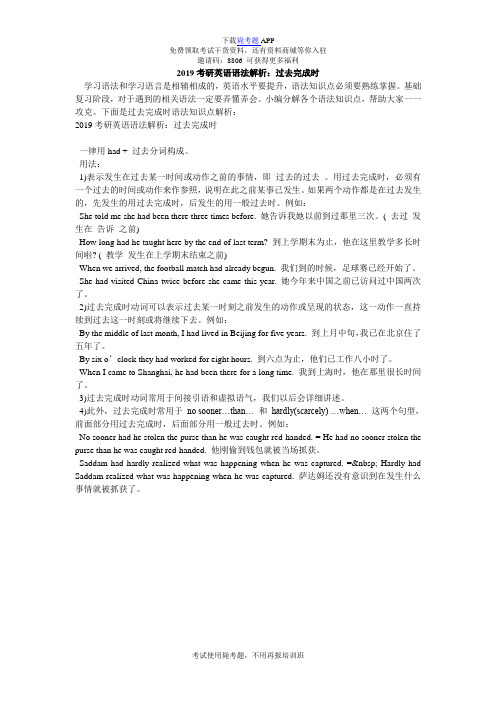
下载毙考题APP免费领取考试干货资料,还有资料商城等你入驻邀请码:8806 可获得更多福利2019考研英语语法解析:过去完成时学习语法和学习语言是相辅相成的,英语水平要提升,语法知识点必须要熟练掌握。
基础复习阶段,对于遇到的相关语法一定要弄懂弄会。
小编分解各个语法知识点,帮助大家一一攻克。
下面是过去完成时语法知识点解析:2019考研英语语法解析:过去完成时一律用had + 过去分词构成。
用法:1)表示发生在过去某一时间或动作之前的事情,即过去的过去。
用过去完成时,必须有一个过去的时间或动作来作参照,说明在此之前某事已发生。
如果两个动作都是在过去发生的,先发生的用过去完成时,后发生的用一般过去时。
例如:She told me she had been there three times before. 她告诉我她以前到过那里三次。
( 去过发生在告诉之前)How long had he taught here by the end of last term? 到上学期末为止,他在这里教学多长时间啦? ( 教学发生在上学期末结束之前)When we arrived, the football match had already begun. 我们到的时候,足球赛已经开始了。
She had visited China twice before she came this year. 她今年来中国之前已访问过中国两次了。
2)过去完成时动词可以表示过去某一时刻之前发生的动作或呈现的状态,这一动作一直持续到过去这一时刻或将继续下去。
例如:By the middle of last month, I had lived in Beijing for five years. 到上月中旬,我已在北京住了五年了。
By six o’clock they had worked for eight hours. 到六点为止,他们已工作八小时了。
2021考研英语阅读真题:考研英语(一)第3篇 - 毙考题
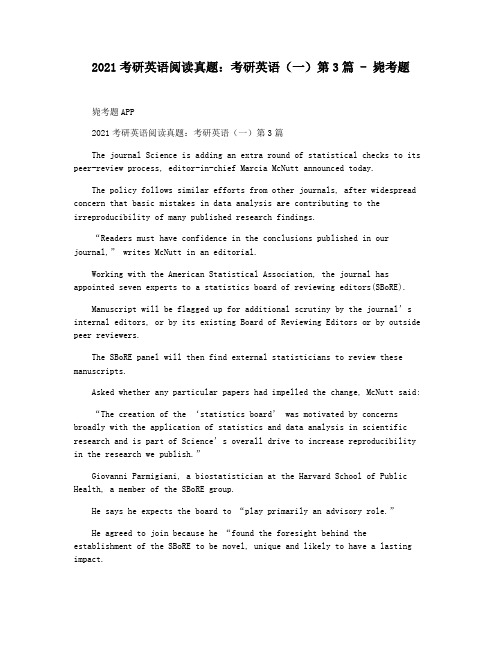
2021考研英语阅读真题:考研英语(一)第3篇 - 毙考题毙考题APP2021考研英语阅读真题:考研英语(一)第3篇The journal Science is adding an extra round of statistical checks to its peer-review process, editor-in-chief Marcia McNutt announced today.The policy follows similar efforts from other journals, after widespread concern that basic mistakes in data analysis are contributing to the irreproducibility of many published research findings.“Readers must have confidence in the conclusions pu blished in our journal,” writes McNutt in an editorial.Working with the American Statistical Association, the journal has appointed seven experts to a statistics board of reviewing editors(SBoRE).Manuscript will be flagged up for additional scrut iny by the journal’s internal editors, or by its existing Board of Reviewing Editors or by outside peer reviewers.The SBoRE panel will then find external statisticians to review these manuscripts.Asked whether any particular papers had impelled the change, McNutt said:“The creation of the ‘statistics board’ was motivated by concerns broadly with the application of statistics and data analysis in scientific research and is part of Science’s overall drive to increase reproducibility in the rese arch we publish.”Giovanni Parmigiani, a biostatistician at the Harvard School of Public Health, a member of the SBoRE group.He says he expects the board to “play primarily an advisory role.”He agreed to join because he “found the foresight b ehind the establishment of the SBoRE to be novel, unique and likely to have a lasting impact.考试使用毙考题,不用再报培训班邀请码:8806毙考题APPThis impact will not only be through the publications in Science itself, but hopefully through a larger group of publishing places that may want to model their approach after Science.”John Ioannidis, a physician who studies research methodology, says that the policy is “a most welcome step forward” and “long overdue.”“Most journals are weak in stat istical review, and this damages the quality of what they publish.I think that, for the majority of scientific papers nowadays, statistical review is more essential than expert review,” he says.But he noted that biomedical journals such as Annals of Internal Medicine, the Journal of the American Medical Association and The Lancet pay strong attention to statistical review.Professional scientists are expected to know how to analyze data, but statistical errors are alarmingly common in published research, according to David Vaux, a cell biologist.Researchers should improve their standards, he wrote in 2021, but journals should also take a tougher line, “engaging reviewers who are statistically literate and editors who can verify the process”.Vaux says that Science’s idea to pass some papers to statisticians “has some merit,but a weakness is that it relies on the board of reviewing editors to identify ‘the papers that need scrutiny’ in the first place”.总主编马西娅・麦克娜特今天宣布:《科学》杂志在同行评阅之外又增加一轮数据审查。
考研英语阅读材料汇编之科技类(2)-毙考题

考研英语阅读材料汇编之科技类(2)阅读是考研英语的重要题型之一,也是保障英语成绩的关键题目。
因此,考研学子们要充分重视英语阅读,除了平时多多阅读英语杂志、报纸外,还需要针对阅读进行专项训练。
小编整理了关于考研英语阅读题源的系列文章考研英语阅读材料汇编之科技类(2),请参考!Who s the Smart Sibling?Ten weeks ago, Bo Cleveland and his wife embarked on a highly unscientific experiment-they gave birth to their first child. For now, Cleveland is too exhausted to even consider having another baby, but eventually, he will. In fact, hes already planned an egalitarian strategy for raising the rest of his family. Little Arthur won t get any extra attention just because he s the firstborn, and, says his father, he probably won t be much smarter than his future .siblings; either. It s the sort of thing many parents would say, but it s a bit surprising coming from Cleveland,who studies birth order and IQ at Pennsylvania State University. As he knows too well, a study published recently in the journal Science suggests that firstborns do turn out sharper than their brothers and sisters, no matter how parents try to compensate. Is Cleveland wrong? Is Arthur destined to be the smart sibling just because he had the good luck to be born first?For decades, scientists have been squabbling over birth order like siblings fighting over a toy. Some of them say being a first-, middle- or lastborn has significant effects on intelligence. Others say that s nonsense, The spat goes back at least as far as Alfred Adler, a Freud-era psychologist who argued that firstborns had an edge. Other psychologists found his theory easy to believemiddle and youngest kids already had a bad rap, thanks to everything from primogeniture laws to the Prodigal Son. When they set out to confirm the birth-order effects Adler had predicted, they found some evidence. Dozens of studies over the next several decades showed small differences in IQ; scholastic-aptitude tests and other measures of achievement So did anecdata suggesting that firstborns were more likely to win Nobel Prizes or become (ahem) prominent psychologists.But even though the scientists were turning up birth-order patterns easily, they couldn tpin down a cause. Perhaps, one theory went, the mother s body was somehow attacking the lateroffspring in uterus. Maternal antibody levels do increase with each successive pregnancy. Butthere s no evidence that this leads to differences in intelligence, and the new study in Silence,based on records from nearly a quarter of a million young Norwegian men, strikes down theantibody hypothesis. It looks at kids who are the eldest by accident-those whose older siblingsdie in infancy--as well as those who are true firstborns. Both groups rack up the same highscores on IQ tests. Whatever is lowering the latterborns scores, it isn t prenatal biology, sincebeing raised as the firstborn, not actually being the firstborn, is what counts.The obvious culprits on the nurture side are parents. But it s hard to think that favoritism toward firstborns exists in modem society. Most of us no longer view secondborn as second best, and few parents will admit to treating their kids differently. In surveys, they generally say they give their children equal attention. Kids concur, reporting that they feel they re treated fairly.Maybe, then, the problem with latterborns isn t nature or nurture-maybe there simply isn t a problem. Not all the research shows a difference in intelligence. A pivotal 2000 study by Joe Rodgers ,now a professor emeritus at the University of Oklahoma, found no link between birth order and smarts. And an earlier study of American families found that the youngest kids, not theoldest, did best in school. From that work, say psychologist Judith Rich Harris, a prominent critic of birth-order patterns, it s clear that the impression that the firstborn is more often the academic achiever is false.Meanwhile, many of the studies showing a birth-order pattern in IQ have a big, fat,methodological flaw. The Norwegian Science study is an example, says Cleveland: It scomparing Bill, the first child in one family; to Bob, the second child in another family. Thatwould be fine if all families were identical, but of course they aren t. The study controls forvariables such as parental education and family size. But Rodgers, the Oklahoma professor,notes that there are hundreds of other factors in play; and because it s so hard to discountall of them, he s not sure whether the patterns in the Science article are real.No one is more sensitive to that criticism than the Norwegian scientists. In fact, theyalready have an answer ready in the form of a second paper. Soon to be published in thejournal Intelligence, it s, similar to the Science study except for one big thing: instead ofcomparing Bill to Bob, it compares Bill to younger brothers Barry and Barney. The samebirth- order pattern shows up: the firstborns, on average, score about two points higher thantheir secondborn brothers, and hapless thirdborns do even worse. The purpose of thetwo papers was exactly the same, says Petter Kristensen of Norway s National Instituteof Occupational Health, who led both new studies. But this second one is much more comprehensive, and in a sense it s better than the Science paper. The data are there--within families, birth order really does seem linked to brain power. Even the critics have to soften their positions a little. The Intelligence study must be taken very seriously says Rodgers.No one, not even Kristensen, thinks the debate is over For one thing, there s still that argument about what s causing birth-order effects. It s possible, says UC Berkeley researcher Frank Sulloway, that trying .to treat kids in an evenhanded way in fact results in inequity. Well-meaning parents may end up shortchanging middleborns because there s one thing they can t equalize: at no point in the middle child s life does he get to be the only kid inthe house. Alternatively, says Sulloway; there s the theory he has his money on, the family- niche hypothesis Older kids, whether out of desire or necessity axe often called on to be assistant parents, he notes. Getting that early- taste of responsibility may prime them for achievement later on. If they think Oh, I m supposed to be more intelligent so I d betterdo my homework, it doesn t matter if they actually are more-intelligent, says Sulloway, Itbecomes a self-fulfilling prophecy. If the firstborns homework involves reading Science and Intelligence, there ll be no stopping them now.词汇注解重点单词embark / im ba:k/【文中释义】v.着手,从事【大纲全义】v. (使)上船(或飞机,汽车等):着手,从事extra / ekstr /【文中释义】adj.额外的【大纲全义】adj额外的,附加的n.附加物,额外的东西adv.特别地compensate / kɔmpənseit/【文中释义】v.补偿,弥补【大纲全义】v.(for)补偿,赔偿,抵消nonsense / nɔnsəns/【文中释义】n.荒谬的言行,胡话【大纲全义】n.胡说,废话;冒失(或轻浮)的行为rap / r p/【文中释义】n.不公正的判决,苛评【大纲全义】n.叩击,轻拍,斤责,急敲(声);不公正的判决,苛评,v. 敲,拍,打,斤责,使着迷predict / pri dikt/【文中释义】v.预言【大纲全义】v.预言,预测,预告prominent / prɔminənt/【文中释义】adj杰出的【大纲全义】adj.突起的,凸出的;突出的,杰出的offspring /ɔfspriŋ; (us) ɔ:f-/【文中释义】n..子孙,后代【大纲全义】n. 子孙,后代,结果,产物;(动物的)崽successive /sək sesiv/【文中释义】adj.连续的【大纲全义】adj.接连的,连续的pregnancy / Pregnənsi/【文中释义】n.怀孕【大纲全义】n.妊振;怀孕(期);(事件等的)酝酿;(内容)充实,富有意义nurture / nə: tʃə/【文中释义】n.养育,教育【大纲全义】n.营养品;养育,培养,滋养v. 给予营养物,养育,培养,滋养超纲单词egalitarian n. 平等主义sibling n. 兄弟妞妹squabble v. 为争吵spat n. 争吵primogeniture n. 长子身份aptitude n. 才能,资质anecdata n. 二逸事证据prenatal adj. 产前的,出生前的重点段落译文两周前,伯克利夫兰和他的妻子进行了一项非常不科学的实验他们生下了他们的第一个孩子。
2019考研英语必考词组_毙考题 (27)

考研必考词组27考研必考词组26 261. for free idm (=without charge)ad.免费262. in full idm (=including the whole of something)v.全部地,完全地263. make fun of sb/sth idm (=to make a joke about someone or something in a way that is not kind)v.拿开玩笑,愚弄264. get along (with sb) phr v (=if two or more people get along, they have a friendly relationship)v.相处融洽,与相处融洽265. get around/round (doing) to sth phr v (=to do something that you have been intending to do for some time)v.抽出时间来做(某事)266.get down to sth phr v (=to start to direct your efforts and attention towards something)v.开始认真处理,着手做267. give in phr v (=to accept that you have been defeated and agree to stop competing or fighting)v.认输,投降268. give sth in (to sb) phr v (=to hand over sth to sb in authority)v.呈上,交上269. give up phr v (=to stop doing a regular activity or job)v.停止,放弃,不再做270. give yourself up phr v (=to allow the police or an enemy to take you as a prisoner)v.自首,投降。
2018考研英语常用动词-毙考题-4
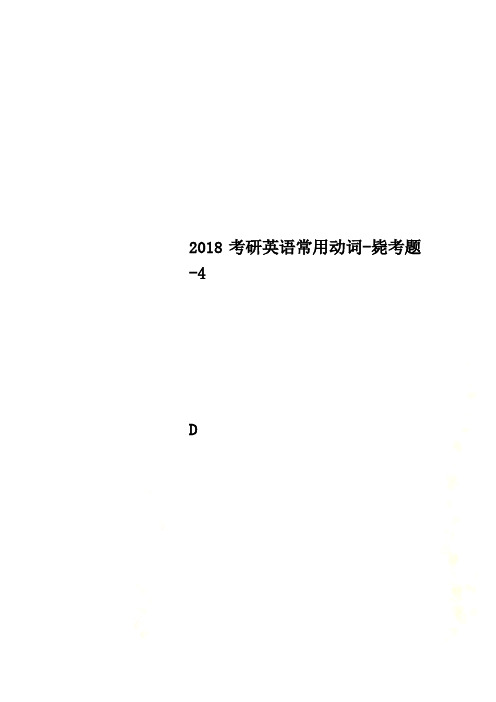
2018考研英语常用动词-毙考题-4Dmooring n 停泊(moor停船)clothing n 衣服(cloth布)flooring n 地板材料(floor地板)building n 建筑物(build建造)filling n 填料(fill填)legging n 绑腿(leg腿)footing n 立足点(foot足)(3)表名词,行业fishing n 渔业(fish鱼)banking n 银行业(bank银行)abvertising n 广告业(advertise做广告)accounting n 会计学(account计算)shoemaking n 制鞋业(shoe鞋+make制造+ing) dancing n 舞蹈(dance跳舞)(4)表形容词,正…的,令人…的envoreaging a 鼓舞人心的(encourage鼓励)changing a 正在变化的(change变化)outgoing a 友善的(out出+go走…走出去和别人交往…友善的)assuming a 自负的(assume自以为是,认为+ing)engrossing a 引人入胜的(engross吸引)fascinating a 迷人的(fascinate使…入迷)ingratiating a 讨好的(ingratiate讨好;grat感激)discriminating a 有辨别力的(discriminate分辨)exhilarating a 使人兴奋的(exhilarate兴奋,高兴;参考:hilarious十分高兴的)riceting a 十分精彩的(rivet柳钉,如柳钉一样牢牢吸引住)inviting a 诱人的(inviet邀请)81.-ion(1)表名词,动作或状态concision n 简洁,简明(concise简洁的,con+cise剪…把多余的剪掉)propulsion n 推进(propulse推进,pro+pulse 冲动)expansion n 扩张(expanse扩大,ex出+panse 扩展)apprehension n 担忧;逮捕(apprehend担心,逮捕,ap+prehend抓住)aversion n嫌恶,憎恨(averse逆反的,反对的,a反+verse转)obsession n 入迷(obsess入迷,ob在…中+sess 坐…坐在中间…入迷)profusion n 丰富;浪费(profuse…浪费的;充沛的,pro+fuse流)collusion n 勾结,串通(collude串通,搞阴谋,col+lud玩…共同玩)discussion n 讨任(discuss讨论,dis+cuss敲打…分开敲打…讨论)possission n 拥有,占有(possess拥有,pos能+sess坐…能坐在上面…拥有)approbation n 称赞,认可(approbate称赞,ap+prob证明+ate→证明正确)classification n 分类(classify分类,class类别+ify)allocation n 分配,拨给(allocate分配,al+loc 地方+ate…拨到地方上)convocation n 召集,会议(convoke召集,con+voke喊)dilapidation n 破旧,荒废( dilapidate使倒塌,di分开+lapid石头…扔石头…毁坏)obligation n 责任;债务(oblige对---负责任,ob[=to]+lig捆→捆起来)affiliation n 入会,加入(affiliate使紧密联系,a+fil儿子+iate)consolation n 安慰(console安慰,con+sole安慰)resignation n 辞职;听从(re后退+sign签字…辞去职位)lucubration n 刻苦研究(lucubrate刻苦攻读,luc灯光+ubr工作+ation)inflation n 通货膨胀(inflate充气,膨胀;in+flate气)(2)表示某种物,用品accordion n 手风琴(accord和谐+ion)cushion n 靠垫(cush垫+ion)carrion n 腐肉(carr肉+ion)scorpion n 蝎子(scorp原意是一种鱼,转化为蝎子)mansion n 大厦(manse住宅+ion)carnation n 康乃馨(carn肉+ation,康乃馨为肉色)confection n 甜食(con一同+fect做+ion…混合制成的糖果甜食)82.-ior表形容词,较…的anterior a 较早的(anter早)posterior a 较后的(poster后)exterior a 外部的(exter外)interior a 内部的(inter内)superior a 在上面的,超越的(super在上面) inferior a 低下的(infer下面)ulterior a 较晚的,较远的(ulter远)senior a 年长的(sen年老)junior a 年少的(jun年轻)83.-ious表形容词,…的curious a 好奇的(cur关心+ious)contagious a 传染的(con共同+tag接触+ious) specious a 似是而非的(spec看+ious…看上去是而实际不是)spacious a 宽敞的(spac空间+ious)penurious a 贫困的;小气的(penury贫困+ious) flirtatious a 调情的(flirt调情+ate+ious)euphonious a 悦耳的(eu美好+phon声音+ious)parsimonious a 小气的(parsi花费+mon警告,小心+ious…花钱小心…小气的)tedious a 冗长沉闷的(ted厌倦+ious)commodious a 宽敞的(commod舒适方便+ious)84.-ise(1)表动词后缀,和-ize相同,是-ize的变体,…化memorise v 记住(memor记忆)criticise v 批评(ctitic批评家)advertise v 做广告(advert注意到,ad+vert 转+ise)authorise v 授权(anthor权力;参考authority 权威)fertilise v 施肥,授精(fert肥沃…fertile 肥沃的)revitalise v 使复活(re再+vital活的)注:由-ize构成的一些动词publicize v 宣传(public公开的)exorcize v 驱除(坏事)(ex出+orc巫术,邪魔+ize)aggrandize v 扩张(ag+grand大+ize)jeopardize v 危害(jeopard危害+ize)materialize v 赋予…形体(material物质+ize) neutralize v 使中和(neutral中间的,中和的+ize)sterilize v 杀菌;使不育(steril无菌的+ize)homogenize v 使一致(homo相同+gen产生+ize)lionize v 崇拜(lion狮子+ize…把人当狮子看…崇拜)temporize v 拖延时间(tempor时间+ize)industrialize v 工业化(industrial工业的+ize) popularize v 推广,普及(popular流行的+ize) (2)表名词,物品,状态merchandise n 商品(merchant商人+ise)turquoise n 绿松石(turquo=turkish;因绿松石来自土耳其面得名)mortise n 榫眼(mort死+ise…木头敲进榫眼使…不再动摇)treatise n 论文(treat 治疗;研究+ise)exercise n 练习,锻炼(ex出+erc力量+ise) 85.-ish n(1)表形容词,像…一样,有的… ,通常放在一具体名词后snobbish a 势利眼的(snob势利眼)faddish a 时尚的,时髦的(fad时尚,流行的狂热)fiendish a 极凶恶的(fiend魔鬼)modish a 时髦的(mode时髦)waggish a 滑稽的(wag小丑)sluggish a 行动迟钝的(slug懒汉)churlish a 脾气暴躁的(churl粗鄙之人,小气鬼)boorish a 粗野的(boor粗野之人)coltish a 放荡不羁(colt小马驹)childish a 孩子气的(child孩子)bookish a 书生气的(book书本)foolish a 愚蠢的(fool笨蛋)coldish a 稍冷的(cold冷)yellowish a 微黄的(yellow黄色的)fattish a 稍胖的(fat胖)(2)表动词,造成…furbish v 刷新(furb擦亮+ish)embellish v 装饰(em进入+bell美丽+ish)polish v 擦亮(pol擦亮+ish)famish v 挨饿(fam饿+ish;参考;famine饥荒) banish v 放逐,摒弃(ban禁止,放弃+ish) admonish v 告诫(ad+mon警告+ish)impoverish v 使成赤贫(im进入+pover贫困+ish;参考:poverty贫困)vanquish v 征服(vanqu克服+ish)diminish v 缩小(di使+min小+ish)flourish v 繁荣(flour花+ish)vanish v 消失(van空,失去+ish)nourish v 养育,哺育(nour营养+ish)(3)表示国家的或语言english a 英国的n. 英语turkish a 土耳语的n. 土耳语swedish a 瑞典的n. 瑞典语lrish a 爱尔兰的n. 爱尔兰语。
巧克2019考研英语单词:熟词僻义(四)-毙考题

巧克2019考研英语单词:熟词僻义(四)1.actv.①行动,做事;②(on)起作用;③表演;④(for)代表,代替;n.①行为,动作;②(一)幕;③法令,条例【真题链接】Governments throughout the world act (v.②) on the assumption that the welfare of their people depends largely on the economic strength and wealth of the community.[2000年翻译]【译文】世界各国的政府的行为都基于这样一种假设,即人民的福利在很大程度上取决于社会的经济实力和国家的财富。
【真题链接】The paid manager acting (v.④) for the company was in more direct relation with the men and their demands, but even he had seldom that familiar personal knowledge of the workmen which the employer had often had under the more patriarchal system of the old family business now passing away.[1996年Text3]【译文】代表公司进行管理的领薪经理们与工人和工人的需求形成更加直接的关系,但甚至他们也很少像正在被淘汰的旧式家族企业的家长制中的雇主那样熟悉和了解工人的情况。
【真题链接】Some , however , are less reasonable processes of different growth in which preconception of the form scientific theory ought to take, by persons in authority, act (n.①) to alter the growth pattern of different areas.[1996年翻译]【译文】然而,有些发展速度存在差异的原因就不尽合理,这是因为某些权威人士对科学理论研究应该采取的方式有偏见,从而改变了不同科学领域的发展模式。
考研英语真题高频词汇分类汇总-毙考题
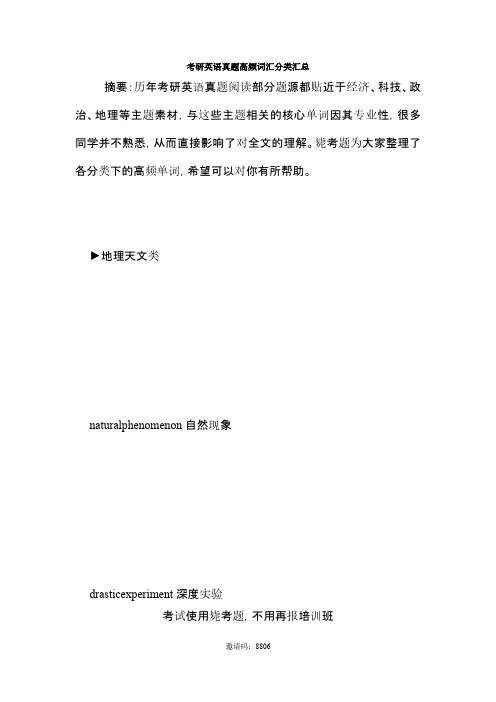
考研英语真题高频词汇分类汇总摘要:历年考研英语真题阅读部分题源都贴近于经济、科技、政治、地理等主题素材,与这些主题相关的核心单词因其专业性,很多同学并不熟悉,从而直接影响了对全文的理解。
毙考题为大家整理了各分类下的高频单词,希望可以对你有所帮助。
►地理天文类 naturalphenomenon自然现象 drasticexperiment深度实验考试使用毙考题,不用再报培训班 externalresult外力作用的结果 carbondioxide二氧化碳 photosynthesis光合作用考试使用毙考题,不用再报培训班 ozonelayer臭氧层 atmospherepressure气压 aircurrent气流考试使用毙考题,不用再报培训班 watervapor水蒸汽 saturation饱和 tidalwave潮汐考试使用毙考题,不用再报培训班 hotspot热点 icecap冰冠 icesheet冰盾考试使用毙考题,不用再报培训班 Iceage冰河世纪 landmass大陆块 hemisphere半球考试使用毙考题,不用再报培训班 gravitation地心引力 solarsystem太阳系 lightyear光年 galaxy星系考试使用毙考题,不用再报培训班 cluster星云 detector探测器 spaceshuttle宇宙飞船考试使用毙考题,不用再报培训班 spaceexploration宇宙勘探 verticalflight垂直飞行 ►生物医学类考试使用毙考题,不用再报培训班 evolution进化 evolutionarytheory进化论 naturalselection物竞天择考试使用毙考题,不用再报培训班 submicroscopic亚微观的 Bio-medical生物医学的 molecularbiology分子生物学考试使用毙考题,不用再报培训班 epidemic流行病 cataract白内障 shot皮下注射考试使用毙考题,不用再报培训班 depressant镇静剂 hallucination迷幻药 sulfuricacid硫酸 bypass替代管考试使用毙考题,不用再报培训班 vaccine疫苗 immunization使免疫 gene基因考试使用毙考题,不用再报培训班 simplesugar单糖 tissue组织 hip股骨考试使用毙考题,不用再报培训班 nervoussystem神经系统 centralnervoussystem中枢神经系统 surgeon外科医师考试使用毙考题,不用再报培训班 physician内科医师 therapy治疗 clinical临床的考试使用毙考题,不用再报培训班 symptom症状,征兆 physicaladdiction生理上瘾 psychologicaldisorder心理失调考试使用毙考题,不用再报培训班 psychologicaltest心理测试 mortality死亡率 ►网络通信类 Database数据库考试使用毙考题,不用再报培训班 datebit数据位 searchagent搜索代理 interactive交互式的考试使用毙考题,不用再报培训班 keyin键入 post粘贴帖子 keyword关键词考试使用毙考题,不用再报培训班 repeatedviste回访 match匹配项 electronics电子学考试使用毙考题,不用再报培训班 telecommunication无线电通讯 electronicmail电子邮件 teleconference远程会议考试使用毙考题,不用再报培训班 distantconferencesite远程会议站 sharingofinformation信息共享 microprocessor微处理器考试使用毙考题,不用再报培训班 transistorcircuit晶体管电路 semiconductor半导体 electrify电气化 researchproductivity研发能力考试使用毙考题,不用再报培训班 ►信息技术类 accesstime存取时间 anti-virusprograms杀毒软件考试使用毙考题,不用再报培训班 assembler汇编程序 barcode条形码 beeper传呼机考试使用毙考题,不用再报培训班 bufferstorage缓冲存储器 callinstruction呼叫指令 cellular手机考试使用毙考题,不用再报培训班 comsat通讯卫星 cordlesstelephone无绳电话 cursor光标考试使用毙考题,不用再报培训班 cybercrimes网上犯罪 cyberspace电脑空间,网络世界 desktop台式计算机考试使用毙考题,不用再报培训班 digitaltelevision数字电视 electronichearingaid电子助听器 encryption加密 fast-forward放录像带等时的快进考试使用毙考题,不用再报培训班 fiberoptictechnology光纤技术 firewall防火墙 flatpaneldisplay平板显示技术考试使用毙考题,不用再报培训班 floppydisk软盘 geneticengineering基因工程 hacker黑客考试使用毙考题,不用再报培训班 identifier标识符 intelligentsystem智能系统 intranet内联网考试使用毙考题,不用再报培训班 IT-industry信息产业 know-how(技术)诀窍 laser激光考试使用毙考题,不用再报培训班 long-distanceeducational system远程教育系统 microprocessor微处理机考试使用毙考题,不用再报培训班 minicomputer小型计算机 multimedia多媒体 multimedialearningsystem多媒体学习系统 netsurfed网虫考试使用毙考题,不用再报培训班 ►微观经济类 productivity生产力 production生产,产品考试使用毙考题,不用再报培训班 transaction交易 consumption消费 subscribeto订购考试使用毙考题,不用再报培训班 commodity日用品 inferiorarticle劣质商品 qualitatively质量上考试使用毙考题,不用再报培训班 monopoly垄断 merger合并,回归 consolidation巩固,合并考试使用毙考题,不用再报培训班 incorporate合并 downscale缩减规模 centralization集中,中央集权化考试使用毙考题,不用再报培训班 professionalization职业化 freight运费 shippper托运人,发货人 premium保险费考试使用毙考题,不用再报培训班 dealership代理权,经销权 retailer零售商 surplus过剩考试使用毙考题,不用再报培训班 predominance优势 vitality活力 unexploited为开发的考试使用毙考题,不用再报培训班 energy-intensive能源密集型的 commercialized使商业化 underfund对提供资金不足考试使用毙考题,不用再报培训班 mountainousdebt负债累累 freeenterprise自由企业 limitedliabilitycompany有限责任公司考试使用毙考题,不用再报培训班 bureaucraticmanagement官僚式管理 topmanagement高层管理 administration管理,经营考试使用毙考题,不用再报培训班 administrator管理人员 shareholder股东 executivedirector执行理事 entrepreneur企业家考试使用毙考题,不用再报培训班 competitor竞争者 consultancy顾问职业 blueprint蓝图考试使用毙考题,不用再报培训班。
2018考研英语常用动词_毙考题_18
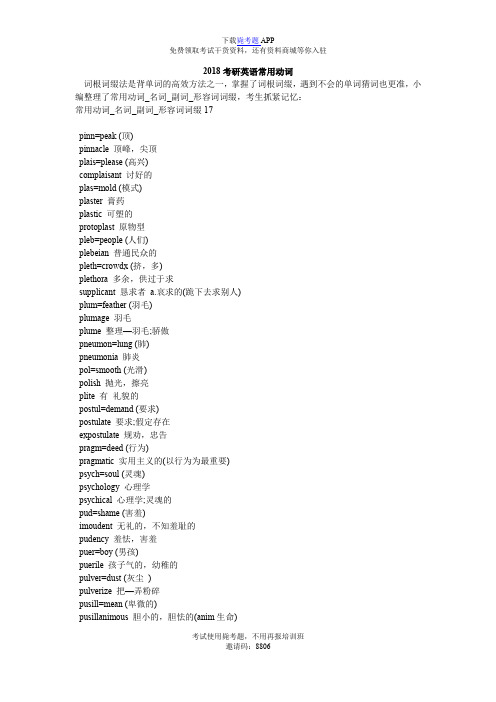
2018考研英语常用动词词根词缀法是背单词的高效方法之一,掌握了词根词缀,遇到不会的单词猜词也更准,小编整理了常用动词_名词_副词_形容词词缀,考生抓紧记忆:常用动词_名词_副词_形容词词缀17pinn=peak (顶)pinnacle 顶峰,尖顶plais=please (高兴)complaisant 讨好的plas=mold (模式)plaster 膏药plastic 可塑的protoplast 原物型pleb=people (人们)plebeian 普通民众的pleth=crowdx (挤,多)plethora 多余,供过于求supplicant 恳求者a.哀求的(跪下去求别人)plum=feather (羽毛)plumage 羽毛plume 整理—羽毛;骄傲pneumon=lung (肺)pneumonia 肺炎pol=smooth (光滑)polish 抛光,擦亮plite 有礼貌的postul=demand (要求)postulate 要求;假定存在expostulate 规劝,忠告pragm=deed (行为)pragmatic 实用主义的(以行为为最重要)psych=soul (灵魂)psychology 心理学psychical 心理学;灵魂的pud=shame (害羞)imoudent 无礼的,不知羞耻的pudency 羞怯,害羞puer=boy (男孩)puerile 孩子气的,幼稚的pulver=dust (灰尘)pulverize 把—弄粉碎pusill=mean (卑微的)pusillanimous 胆小的,胆怯的(anim生命)pyr=fire (火)pyre 火葬柴堆empyrean 苍天,太空(em进入+pyr+ean,进入火—进入太阳—天空) quarant=forty (四十)quarantine 隔离检查(被隔离40天)quer=complain ( 抱怨)querulous 抱怨的quarrel 争吵rab=rage (怒)rabid 狂怒的,狂热rabies 狂犬病radi =ray (光线)radiant 发光的irradiate 发光,(光)漫射ram=branch (枝)ramify 分叉,分枝ramiform 枝状的reg=king (国王)regnant 国王的,皇家的regicide 杀害国王regn=reign ( 王朝)regnant 统治的,占优势的intrerregunm 无王时期remn=remain (留下)remnant 剩余物rest=stay (停留)arrest 阻止,逮捕redtless 不安的;得不到休息的(和restive 是同一意思)retic=silent (安静)reticent 沉默的rever=awe (敬畏)revere 尊敬reverent 尊敬的,敬畏的rhe=flow (流)diarrhea 痢疾(dia对穿—对穿流过—拉肚子)rheum 泪水rhin=nose (鼻子)rhinoceros 犀牛riv=stream (河流)rivulet 小河(let表示小)derive 派生,得出rug=wrinkle (皱)corrugate 起皱(cor一起,皱到一起)sacchar=sugar (糖)saccharin 糖精salu=health (健康)salubrious 有益健康的(salubr=salu) salutary 有益健康的sanat=taste (味道)sapid 美味的,有趣的insipis 无味的;无吸引力的sarc=flesh (肉)。
- 1、下载文档前请自行甄别文档内容的完整性,平台不提供额外的编辑、内容补充、找答案等附加服务。
- 2、"仅部分预览"的文档,不可在线预览部分如存在完整性等问题,可反馈申请退款(可完整预览的文档不适用该条件!)。
- 3、如文档侵犯您的权益,请联系客服反馈,我们会尽快为您处理(人工客服工作时间:9:00-18:30)。
2018考研英语常用动词词根词缀法是背单词的高效方法之一,掌握了词根词缀,遇到不会的单词猜词也更准,小编整理了常用动词_名词_副词_形容词词缀,考生抓紧记忆:常用动词_名词_副词_形容词词缀24表名词,人和物,由-ify转化而来glorifier n 颂扬者(glorify颂扬)pacifier n 安定者(pacify抚慰)falsifier n 伪造篡改者(falsify伪造)amplifier n 扩音器(amplify扩音)liquefier n 液化器(liquefy液化)(1)表形容词,…的merchantile a 商人的(merchant商人)servile a 奴性的(serv服务+ile)juvenile a 青少年的(juven年轻+ile)fertile a 肥沃的(fert带有;繁殖+ile)infertile a 不毛的,不能生育的(in不+fertile)tortile a 扭弯的(tort扭曲+ile)ductife a 可塑的(duct引导+ile)volatile a 挥发的;易变的(volat 飞+ile;参考:volation鸟的飞行能力)senile a 年老的(sen老+ile;参考:senior年长的,高年级的)(2)表名词,物体missile n 发射物,导弹(miss发送+ile)projectile n 抛射物(project投射)profile n 外形,轮廓(pro前面+file线条…前面的线条…轮廓)domicile n 住宅(domic家+ile)automobile n 汽车(auto自己+mob动+ile)(1)表形容词,…的elephantine n 如象的,巨大的(elephant大象)porcine n 猪的(porc猪+ine)canine n 狗的(can狗+ine)saturnine n 阴沉的(saturn土星+ine)marine n 海的(mar海+ine)serpentine n 蜿蜒的(serpent蛇+ine)pristine n 纯洁的;新鲜的(prist[=first]+ine)(2)表名词,人或女人philistine n 市侩(philist菲力斯人…市侩阶层)libertine n 放荡者(liberty自由+ine)figurine n 小塑像(figure形体;塑像+ine)heroine n 女英雄(hero英雄+ine)concubine n 情妇(con共同+cub睡+ine)(3)表名词,状态,药物等doctrine n 教条,教义(doctr教导+ine)discipline n 纪律(disciple门徒,学徒…门徒必须听说…纪律)famine n 饥荒(fam饿+ine;参考:famish挨饿)routine n 常规(rout[=route常走的道路]+ine)caffeine n 咖啡因(caffee咖啡+ine)vaseline n 凡士林(由标名转化而来)iodine n 碘(iod碘+ine)antifebrine n 退烧冰(anti反+febt热+ine)(1)表名词,状态feeling n 感情(feel感觉)ageing n 老化(age年龄)learining n 学问(learn学习)gloaming n 黄昏(gloam渐渐暗下)mooring n 停泊(moor停船)clothing n 衣服(cloth布)flooring n 地板材料(floor地板)building n 建筑物(build建造)filling n 填料(fill填)legging n 绑腿(leg腿)footing n 立足点(foot足)(3)表名词,行业fishing n 渔业(fish鱼)banking n 银行业(bank银行)abvertising n 广告业(advertise做广告)accounting n 会计学(account计算)shoemaking n 制鞋业(shoe鞋+make制造+ing)dancing n 舞蹈(dance跳舞)(4)表形容词,正…的,令人…的envoreaging a 鼓舞人心的(encourage鼓励)changing a 正在变化的(change变化)outgoing a 友善的(out出+go走…走出去和别人交往…友善的)assuming a 自负的(assume自以为是,认为+ing)engrossing a 引人入胜的(engross吸引)fascinating a 迷人的(fascinate使…入迷)ingratiating a 讨好的(ingratiate讨好;grat感激)discriminating a 有辨别力的(discriminate分辨)exhilarating a 使人兴奋的(exhilarate兴奋,高兴;参考:hilarious十分高兴的) riceting a 十分精彩的(rivet柳钉,如柳钉一样牢牢吸引住)inviting a 诱人的(inviet邀请)(1)表名词,动作或状态concision n 简洁,简明(concise简洁的,con+cise剪…把多余的剪掉) propulsion n 推进(propulse推进,pro+pulse冲动)expansion n 扩张(expanse扩大,ex出+panse扩展)apprehension n 担忧;逮捕(apprehend担心,逮捕,ap+prehend抓住)aversion n嫌恶,憎恨(averse逆反的,反对的,a反+verse转)obsession n 入迷(obsess入迷,ob在…中+sess坐…坐在中间…入迷)profusion n 丰富;浪费(profuse…浪费的;充沛的,pro+fuse流)collusion n 勾结,串通(collude串通,搞阴谋,col+lud玩…共同玩)discussion n 讨任(discuss讨论,dis+cuss敲打…分开敲打…讨论)possission n 拥有,占有(possess拥有,pos能+sess坐…能坐在上面…拥有) approbation n 称赞,认可(approbate称赞,ap+prob证明+ate→证明正确) classification n 分类(classify分类,class类别+ify)allocation n 分配,拨给(allocate分配,al+loc地方+ate…拨到地方上) convocation n 召集,会议(convoke召集,con+voke喊)dilapidation n 破旧,荒废( dilapidate使倒塌,di分开+lapid石头…扔石头…毁坏) obligation n 责任;债务(oblige对---负责任,ob[=to]+lig捆→捆起来)affiliation n 入会,加入(affiliate使紧密联系,a+fil儿子+iate)consolation n 安慰(console安慰,con+sole安慰)resignation n 辞职;听从(re后退+sign签字…辞去职位)lucubration n 刻苦研究(lucubrate刻苦攻读,luc灯光+ubr工作+ation)inflation n 通货膨胀(inflate充气,膨胀;in+flate气)(2)表示某种物,用品accordion n 手风琴(accord和谐+ion)cushion n 靠垫(cush垫+ion)carrion n 腐肉(carr肉+ion)scorpion n 蝎子(scorp原意是一种鱼,转化为蝎子)mansion n 大厦(manse住宅+ion)carnation n 康乃馨(carn肉+ation,康乃馨为肉色)confection n 甜食(con一同+fect做+ion…混合制成的糖果甜食)表形容词,较…的anterior a 较早的(anter早)posterior a 较后的(poster后)exterior a 外部的(exter外)interior a 内部的(inter内)superior a 在上面的,超越的(super在上面)inferior a 低下的(infer下面)ulterior a 较晚的,较远的(ulter远)senior a 年长的(sen年老)junior a 年少的(jun年轻)表形容词,…的curious a 好奇的(cur关心+ious)contagious a 传染的(con共同+tag接触+ious)specious a 似是而非的(spec看+ious…看上去是而实际不是)spacious a 宽敞的(spac空间+ious)penurious a 贫困的;小气的(penury贫困+ious)flirtatious a 调情的(flirt调情+ate+ious)euphonious a 悦耳的(eu美好+phon声音+ious)parsimonious a 小气的(parsi花费+mon警告,小心+ious…花钱小心…小气的) tedious a 冗长沉闷的(ted厌倦+ious)commodious a 宽敞的(commod舒适方便+ious)(1)表动词后缀,和-ize相同,是-ize的变体,…化memorise v 记住(memor记忆)criticise v 批评(ctitic批评家)advertise v 做广告(advert注意到,ad+vert转+ise)authorise v 授权(anthor权力;参考authority权威)fertilise v 施肥,授精(fert肥沃…fertile 肥沃的)revitalise v 使复活(re再+vital活的)注:由-ize构成的一些动词publicize v 宣传(public公开的)exorcize v 驱除(坏事)(ex出+orc巫术,邪魔+ize)aggrandize v 扩张(ag+grand大+ize)jeopardize v 危害(jeopard危害+ize)materialize v 赋予…形体(material物质+ize)neutralize v 使中和(neutral中间的,中和的+ize)sterilize v 杀菌;使不育(steril无菌的+ize)homogenize v 使一致(homo相同+gen产生+ize)lionize v 崇拜(lion狮子+ize…把人当狮子看…崇拜)temporize v 拖延时间(tempor时间+ize)industrialize v 工业化(industrial工业的+ize)popularize v 推广,普及(popular流行的+ize)(2)表名词,物品,状态merchandise n 商品(merchant商人+ise)turquoise n 绿松石(turquo=turkish;因绿松石来自土耳其面得名)mortise n 榫眼(mort死+ise…木头敲进榫眼使…不再动摇)treatise n 论文(treat 治疗;研究+ise)exercise n 练习,锻炼(ex出+erc力量+ise)n(1)表形容词,像…一样,有的… ,通常放在一具体名词后snobbish a 势利眼的(snob势利眼)faddish a 时尚的,时髦的(fad时尚,流行的狂热)fiendish a 极凶恶的(fiend魔鬼)modish a 时髦的(mode时髦)waggish a 滑稽的(wag小丑)sluggish a 行动迟钝的(slug懒汉)churlish a 脾气暴躁的(churl粗鄙之人,小气鬼)boorish a 粗野的(boor粗野之人)coltish a 放荡不羁(colt小马驹)childish a 孩子气的(child孩子)bookish a 书生气的(book书本)foolish a 愚蠢的(fool笨蛋)coldish a 稍冷的(cold冷)yellowish a 微黄的(yellow黄色的)fattish a 稍胖的(fat胖)(2)表动词,造成…furbish v 刷新(furb擦亮+ish)embellish v 装饰(em进入+bell美丽+ish)polish v 擦亮(pol擦亮+ish)famish v 挨饿(fam饿+ish;参考;famine饥荒)banish v 放逐,摒弃(ban禁止,放弃+ish)admonish v 告诫(ad+mon警告+ish)impoverish v 使成赤贫(im进入+pover贫困+ish;参考:poverty贫困) vanquish v 征服(vanqu克服+ish)diminish v 缩小(di使+min小+ish)flourish v 繁荣(flour花+ish)vanish v 消失(van空,失去+ish)nourish v 养育,哺育(nour营养+ish)(3)表示国家的或语言english a 英国的n. 英语turkish a 土耳语的n. 土耳语swedish a 瑞典的n. 瑞典语lrish a 爱尔兰的n. 爱尔兰语。
